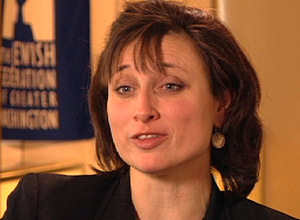In This Episode << SLIDE LEFT TO SEE ADDITIONAL SEGMENTS
Hanukkah’s Light
Dr. ERICA BROWN (Jewish Federation of Greater Washington): In Israel today you’ll find that most menorahs, or as they are called hanukiyot, are lit outside, because that’s the way the commandment should be fulfilled. But because of persecution throughout Jewish history people lit indoors, and they placed their menorahs on tables inside their homes.
On Hanukkah every night we add an additional candle. We begin with one, and the last night we light eight candles. We light them with the aid of a shamash, which is the center candle or the central candle, and you’ll see it often has a special place on a menorah.

We make two blessings on the lighting of the candles. We actually have another blessing that we say on the first night, which is a generalized blessing – “Thank you, God, for bringing us to this day…” And then we add two special blessings just about the miracles of these days, and it’s a good time to think about the miracles in our own lives.
But we also don’t use the Hanukkah lights for anything else. So, for example, we wouldn’t use them to read by or to do any kind of mundane activities by. They are a sacred sort of light while they’re burning.
Because it’s a holiday where we celebrate a small jug of oil that lasted miraculously for eight days, we celebrate all kinds of food cooked with oil. Latkes, which are fried potato pancakes, are very popular at this season. People eat them with applesauce and sour cream. The other thing that’s quite popular are sufganiyot or doughnuts.
I think the holiday season is a time of a lot of generosity and a lot of compassion and goodwill. I do a lot of community teaching in high-tech firms and law firms and other firms. In today’s class, we looked at sources on light and talked about the magical properties of light as a way to start talking about responsibility. How do we have a responsibility when we can see the vulnerable, we can see the oppressed? We can’t walk away from them.
Hanukkah is a time where we take responsibility for the world, not only for ourselves but for spreading kindness through the world.
Certainly at this season of the year I think many Jews, even highly assimilated Jews, feel a lack of belonging in the mainstream culture, and Hanukkah’s always been a good time for them to come together in a social setting to feel a sense of belonging with each other.
Front page photo: “Hanukkah menorah” by Scott Merrill

